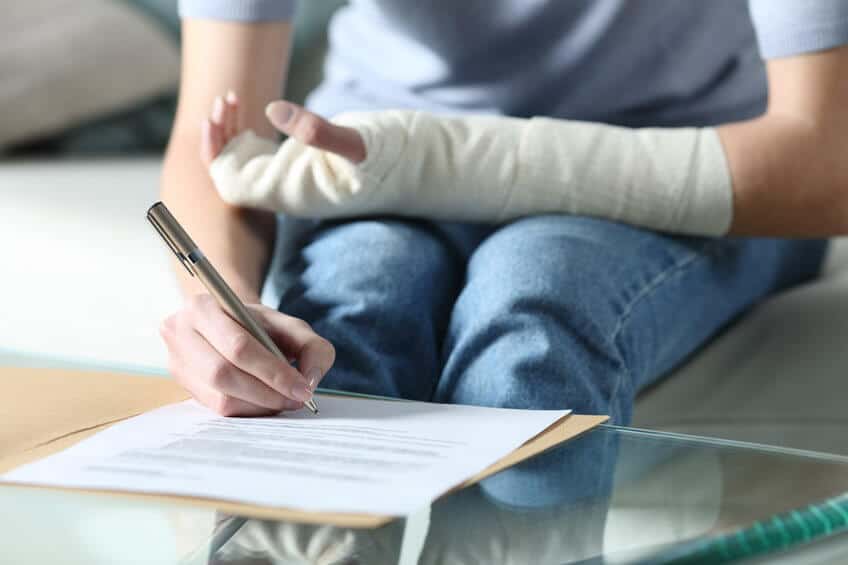Lost Wages After A Car Accident

Injuries from a car accident can have a huge impact on your life. Not only do they cause pain and suffering, but they also may prevent you from being able to work. If this happens, it is important that you know how to file for lost wages so that you are compensated for the time when you were unable to work due to the injuries. In this blog post, Baltimore car accident attorney John Leppler will discuss the steps involved in filing and collecting lost wages after an auto accident.
What is a Lost Wage Claim
A lost wage claim is a legal claim where you are seeking payment for lost wages due to an injury. For example, if someone else’s negligence caused the physical injuries that now prevent you from being able to work, it is possible that this person may be held responsible for lost wages as well as medical bills. In the state of Maryland, the at-fault driver is required to carry $30,000 of liability insurance which would cover your medical bills and lost wages up to the policy limit.
Lost wages would be paid from the date of the accident until you return to your job once medical treatment has been completed and you are able to work.
What is Lost Earning Capacity?
Lost earning capacity refers to the reduced ability of an injured person to earn money and support themselves after a car accident or other personal injury. Under this scenario, lost wages are only part of what you may be entitled to since lost future earnings can also factor into your claim. Proving lost earning capacity is more complicated than lost wages, and it will depend on the circumstances of the case.
How Do I File a Personal Injury Claim?
When you are looking to file a lost wage claim, it is important that you do so as soon as possible. There are 3 options that may pertain to you:
- File a claim with the at-fault driver’s insurance company under their bodily injury liability policy
- File a claim with your own insurance company under your uninsured motorist coverage
- File a claim with your own insurance company under your Personal Injury Protection policy (PIP)
It is a good idea to consult a Baltimore car accident lawyer to go over your options and help you with the lost wage claim process. They will be able to provide assistance with filing any needed paperwork and going through any required steps.
At-Fault Driver’s Liability Coverage
Payment for your lost wages and medical bills are covered under the at-fault driver’s liability insurance policy.
If the fault is clear and the other driver caused the accident, you may want to attempt to file with the other driver’s insurance company. You may come across pitfalls dealing directly with their insurance carrier. Insurance adjusters are known for various tactics making it difficult for you such as:
- Delaying the investigation of your lost wage claim
- Denying that lost wages are covered under their policy
- Attempting to reduce or deny lost wages as a result of an injury. Because it is in their best interest, they will try and pay you less than what you deserve.
You must prove the other driver was negligent. You must prove that the injuries prevented you from working. You must prove through documentation the earnings that were lost due to the injury.
This is exactly why it is important to consult with an experienced personal injury lawyer to help you through this process.
What if the fault is not clear? What if the other driver claims you caused the accident? If this occurs, it is definitely time to consult with a personal injury lawyer. Liability is established by proving that another party caused the accident. Your attorney will help determine who was at fault.
Your Uninsured Motorist Coverage
What if the other driver has the minimum required insurance? What if you were involved in a hit-and-run accident? This is when your own uninsured motorist coverage will come into play.
If the at-fault driver’s policy limits are less than your medical bills and lost wages, then uninsured motorist coverage will help protect you by providing compensation for expenses up to that limit.
If you were involved in a hit-and-run accident, this will likely fall under uninsured motorist coverage as well.
Personal Injury Protection Coverage (PIP)
Personal Injury Protection, also referred to as PIP, is not mandatory in the state of Maryland but insurance companies are required to offer a minimum of $2,500 of PIP coverage. PIP is known as your “no-fault” coverage because it pays your own medical expenses and lost wages no matter who caused the accident.
You must sign a written waiver to opt-out of PIP.
In Maryland, PIP would reimburse you 85% of lost wages up to your policy limits.
Since PIP is offered with policy limits ranging from $2,500 to $10,000, you can see that this coverage will not go a long way if you have a severe injury. The benefit of PIP is that you will get your check within 30 days.
What Information Do I Need to File a Lost Wage Claim?
If the lost wages are for time off of work, it is important that you provide evidence to support this claim including pay statements showing your lost income and timesheets detailing how much time was lost from work due to injury.
If lost wages are due to missed opportunities, it is important that you provide evidence of these lost income-producing events including contracts to perform services, canceled appointments, or other proof showing what would have been earned if not for the accident.
What are the documents needed to file a Lost Wage Claim
The documents needed to file a lost wage claim due to a car accident include:
- Your medical records from any doctors treating you for injuries related to the accident
- Any bills relating to treatment incurred by you or paid by you
- A signed note from your doctor, hospital, physical therapist, or chiropractor recommending that you should not work for a certain number of days or weeks due to your injuries
- A signed letter from your supervisor or a human resources representative at your workplace stating your job title, a brief description of your job duties, and how much money you were making at the time of your car accident.
- Proof of income before the accident and proof of loss of income since the accident
- Your pay stubs for the two months preceding the motor vehicle accident, as well as pay stubs for the time you missed from work following the accident
- W2 forms or tax forms demonstrating your wage or salary income over the last three years
How Can an Attorney Help with Your Car Accident Claim
After a car accident, many people are unsure of what they should do next. Luckily, there is plenty you can do to make the process easier on yourself and more likely to result in favorable outcomes and fair compensation. Let Leppler Injury Law help you navigate through the insurance claim process. Filing a personal injury lawsuit might be the best option. Call John today at (443) 955-1989 for a free consultation. We’re here to help!
